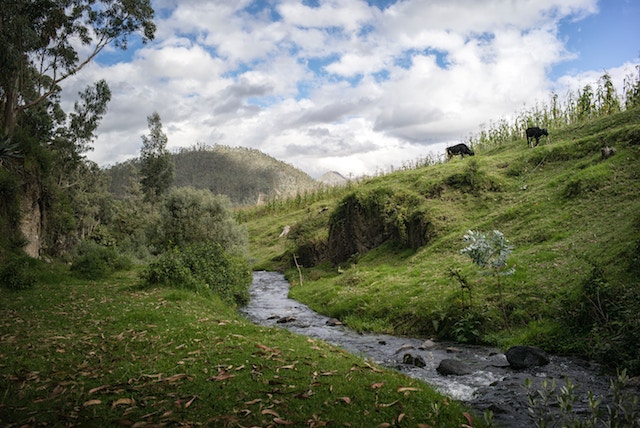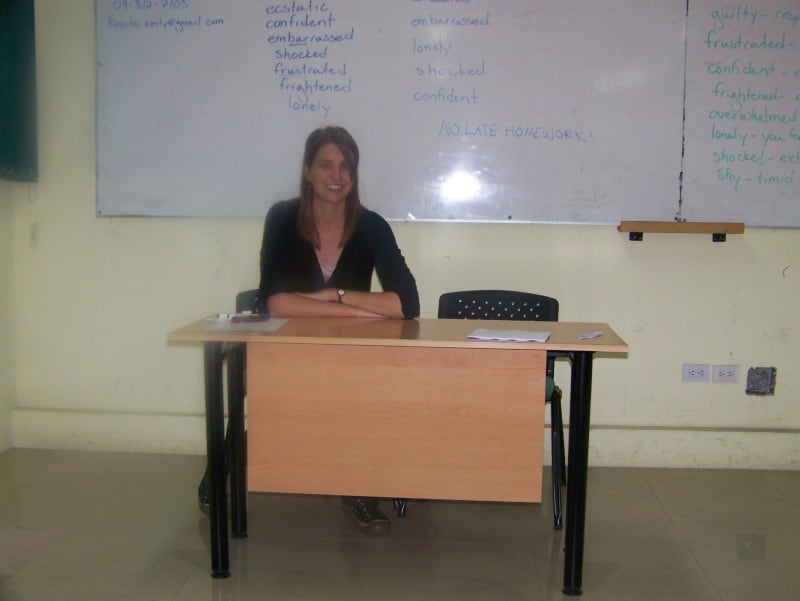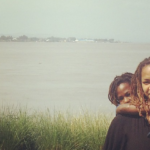Culture Shock in the Classroom: Teaching in Ecuador

The clock ticked past nine, and I gratefully dismissed my night class of English graduate students. Looking forward to the cup of cocoa I was soon to enjoy in my pajamas, I started to gather my things. Suddenly a shriek sounded from the back of the classroom. I looked up. My students Monica and Isabel were drenched in foam, and a gleeful Javier was holding a spray-can.
“Teacher!” he protested when he saw the shock on my face. “It’s Carnaval!” It was true—in Ecuador, Carnaval is a month-long, free-for-all Mardis Gras in which people hang out of car windows with water, foam or bags of flour to toss on unsuspecting passerbys.
“Not in my classroom, it’s not,” I told him dryly. Despite the fact that Javier was my age, I marched him up to the janitor’s office for a rag, some water, and an apology for making a mess of the classroom.

- Emily teaching in Ecuador
The last time my students absorbed this information with thoughtful silence, my student Veronica stood up and announced, “The teacher is trying to say she is Jehovah’s Witness.”
Of course I surprise my students as well. Because few people travel much outside of their hometown–let alone abroad–I am certainly an unusual specimen here. Consequently, I’m greeted with a barrage of questions during conversation classes. Because at 5’10” I tower over most Ecuadorians, I sometimes get the question, “Teacher!” Are you the woman most tall in United States?” Students are curious about American culture. “Teacher!” volunteered Patricia during a conversation session. “I hear that for people of 18 years old in the U.S., there exist two choices – to go to the military or to be a missionary.”
Religion is an especially confusing topic, as close to 100 percent of the country is at least nominally Catholic. Other religions – aside from a few outposts of Mormon, Jehovah’s Witness, and Seventh Day Adventist churches – are almost unheard of. When they ask me what religion I am, I tell them I grew up Lutheran or Protestant.
When met with confused stares, I explain that this is something like Catholicism but without Mary and the saints. Sometimes, this explanation is equally suspect. The last time my students absorbed this information with thoughtful silence, my student Veronica stood up and announced, “The teacher is trying to say she is Jehovah’s Witness.”
A few of the initial surprises, of course, have worn off by now. My students are used to me standing a few inches taller than most men in the class. I’m completely accustomed to students moseying into class twenty minutes late, and to full-grown adults wailing in protest when I announce an exam. “Please, teacher, noooo!!!” they will shriek in agony. It leaves me at a loss as to what they expect from a graduate course, but apparently this technique works on other teachers.
I sometimes get the question, “Teacher!” Are you the woman most tall in United States?”
I’m also accustomed to the administration “forgetting” to pay me on a regular basis. I now accept the fact that to receive a paycheck within a month of the correct time, I must shower the financial department in flattery and imploring phone calls, which I end by emphasizing my eternal gratitude to them for bothering to pick up a pen and sign a form.
Any teaching job, anywhere in the world, will be a mixture of gratification and frustration, a mixture of days when working with students is truly inspiring, and days when you wish you had taken up waitressing instead. Teaching in Ecuador has been all of that for me – and more too.
It has opened up dialogue with Ecuadorians and provided me with a window into Ecuadorian culture that I could never have gotten otherwise. Hopefully, my students now have a better understanding of American culture too. At the very least, both I and my students have gotten some laughs, and maybe they’ve even learned some English grammar along the way too.
Photos for Culture Shock in the Classroom: Teaching in Ecuador by Unsplash and Emily.









how were you able to teach abroad? what did you major in?
Hahaha, definitely can relate – I teach high school English in Ecuador, and have had many similar experiences.
Interesting to read about your experiences – I’m considering teaching English and it’s great to read about how others are finding it.
love this – and laughed, too!